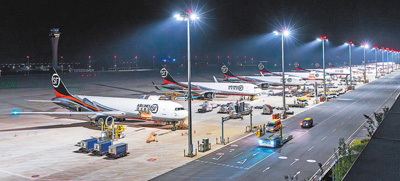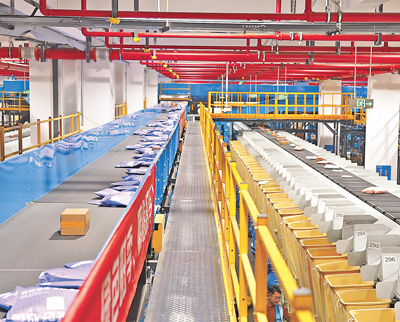




- BRNN
- BRI News
- BRNN News
- Database
Official Documents Polices and Regulations
Inter-government Documents International Cooperation BRI Countries
Business Guide Economic Data BRI Data
Trade
Investment Projects Latest projects
Cases - Content Pool

All-cargo airplanes arrive at the Ezhou Huahu Airport in central China's Hubei Province in the early hours of the day. (Photo/Lu Ye)
China's courier sector handled over 170 billion parcels in 2024, the State Post Bureau announced on Jan. 8, 2025. This achievement showcases the resilience of the express delivery sector and vigor of the Chinese economy.
Intelligent technologies facilitate delivery efficiency
In Yiwu, known as the "world's supermarket" in east China's Zhejiang Province, parcel collection enters the peak period after 8 p.m. every day. In the city, ZTO Express, an express delivery company in China, collects an average of over 20,000 parcels every minute.
In Suxi township of Yiwu, a deliveryman picked up a set of New Year paintings from a client. A tracking number was generated at the ZTO Express big data center. The parcel was then sent to a delivery site for processing before being dispatched to Qingyuan city in south China's Guangdong Province.
Leveraging intelligent technologies, over 14 million parcels are shipped daily from Yiwu via ZTO Express' extensive network of over 100 routes. The majority of these parcels are delivered within approximately 40 hours.
Over the past decade, Yiwu's annual express delivery volume has surged from over 300 million to over 10 billion, representing nearly 9 percent of the national total. This positions Yiwu as the city with the second largest express delivery volume in China.
Today, Yiwu boasts 16 distribution centers, each with a capacity of over 1 million parcels, 77 sets of automated sorting equipment, and more than 500 service sites.
In 2024, Chinese citizens received over 100 parcels on average per person; more than 5,400 parcels were handled per second and the industry set a new single-day record with 729 million packages processed.
Express delivery services see expansion overseas
In the early hours of Jan. 7, an all-cargo airplane of Chinese courier giant SF Express took off from the Ezhou Huahu Airport in central China's Hubei Province.
Among the goods carried by the plane were fresh-cut flowers from southwest China's Yunnan Province. The flowers were picked the day before and arrived at the Incheon International Airport in South Korea at 8 a.m. on Jan. 8.

Parcels are sorted by smart sorting machines at a delivery site of ZTO Express in Suxi town, Yiwu city, east China's Zhejiang Province. (Photo/Li Jianfeng)
By the end of 2024, the Ezhou Huahu Airport, the first cargo airport in China, operated 30 international and regional cargo routes and handled 1.28 million tonnes of cargo. In the early morning hours, hundreds of thousands of parcels are processed at the airport, destined for domestic and overseas locations through 85 routes.
China has set up 297 overseas distribution centers and 333 overseas warehouses. JD Logistics, the logistics arm of Chinese e-commerce giant JD.com, now serves nearly 80 countries and regions globally. Cainiao Network, Alibaba's logistics arm, has extended its "Global 5-Day Delivery" service to 14 countries. Over the past year, China has established or joined service networks in 71 countries and regions.
Express delivery network reaches remote villages

A vehicle of Chinese express delivery firm J&T Express runs on the road in northwest China's Xinjiang Uygur Autonomous Region. (Photo/Liu Qing)
On Dec. 2, 2024, Guliqiman Shayimu, a villager from Shache county in Kashgar, northwest China's Xinjiang Uygur Autonomous Region, received a parcel from Zhejiang with no delivery fees charged. "It only took four days from ordering to receiving the parcel," she said.
Xinjiang and Zhejiang are approximately 4,000 kilometers apart. Once parcels arrive in Urumqi, the regional capital, they must travel hundreds or even thousands of kilometers before reaching their distant destinations. In order to enhance efficiency, express delivery firms are collaborating with e-commerce platforms to implement several measures aimed at lowering delivery expenses.
The parcel received by Guliqiman Shayimu was the 300 millionth parcel bound for Xinjiang handled by J&T Express in 2024.
Currently, the delivery network of J&T Express covers 9,750 administrative villages in Xinjiang. China Post, a state-owned postal service provider, has handled more than 59 million parcels containing specialty products of Xinjiang.
The rapid growth of the express delivery industry indicates two shifts: strong momentum in the central and western regions and a growing role of the industry in fostering coordinated regional development. In 2024, the express delivery volume in the central and western regions increased by 30 percent and 35 percent year on year respectively.

Tel:86-10-65363107, 86-10-65368220, 86-10-65363106